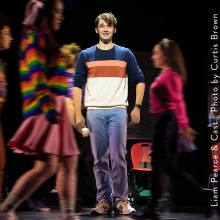
Full Synopsis
Act One
In the Prologue, a wise Mandingo storyteller, Griot, sets the stage for a love story of the ages ("Sands of Time"). The scene flows into a Western Sudanese marketplace, where The Poet uses linguistic acrobatics to convince a group of beggars to buy his poems ("Rhymes Have I"). When he thinks that he is about to make a sale, The Poet summons his daughter, Marsinah, to help close the deal, but the beggar is not interested. The Poet intimates that Marsinah should go steal them some food, if they are to have breakfast.
After Marsinah has left, M'Ballah enters – he is a famous river pirate, the scourge of the Niger. He seeks a magician's help to remove a curse from his family. Many years ago, his son was taken from him as a result of the curse. He offers a bag of gold to the man who can help him find his son. The Poet accepts the money and leads M'Ballah into Timbuktu, despite the fact that it is written that M'Ballah will die in the city ("Fate").
In the court of the Wazir of Police, the chief of the Wazir's wives, Ludanda, returns from visiting her father. It is clear that the Wazir is cruel and unjust, despite his position as head of the Mansa's justice. The Wazir has asked Ludanda's father for money so that he may repay the money that he has taken from the Mansa's account before the new Mansa notices. However, Ludanda, who clearly has no great affection for her husband, has only returned with half of the money – the other half will be delivered when Wazir can convince the Mansa to marry three common women whom Ludanda has brought back with her. Wazir is skeptical, but Ludanda tells him that he can be very persuasive when he has to save his own skin. Frustrated, he leaves, but Ludanda knows that she is right and instructs the other girls to remember the power that women have ("In the Beginning, Woman").
In the market, Marsinah is observed stealing oranges by an Orange Merchant. Meanwhile, the Mansa enters, attended by his friend, Munshi, who calls him Dodo as a nickname. The Poet enters, flush with his money from M'Ballah, and eager to buy things. The Orange Merchant chases Marsinah into the market. She runs to her father, who tells her that they are now rich. He tells the merchants to give her whatever she wants ("Baubles, Bangles and Beads"). Mansa notices Marsinah dressed so finely and is enchanted by her.
Marsinah makes her way to the garden of a house by the river, which she hopes that she now has enough money to buy. Unbeknownst to her, Mansa follows and meets her in the garden. He introduces himself to her as Dodo, and they fall in love instantly ("Stranger in Paradise"). She must go to meet her father but promises to return to the garden at moonrise to meet Mansa. Back in court, the Wazir is getting anxious, because the new Mansa wants a full accounting of his books very soon. As the Wazir continues to dole out injustice, The Poet is brought to court for possessing coins with the mark of M'Ballah of the River. Wazir says to behead The Poet, but Ludanda intervenes. The Wazir then orders The Poet's right hand to be cut off, but he once again uses his lyrical prowess to explain that a man in his line of work is dependent upon using his hands to tell stories ("Gesticulate").
Wazir finds The Poet too clever for his own good, but before he can order him beheaded, M'Ballah of the River is caught and brought to the court. But The Poet curses Wazir, even though Wazir doubts the effectiveness of such a curse. M'Ballah is furious at The Poet and wants justice for having been swindled from his money – he has yet to find his son. Wazir laughs at the whole situation. Suddenly, M'Ballah notices a baby crocodile tattooed on Wazir's leg. It turns out that Wazir is M'Ballah's long-lost son, and so The Poet has made good on his promise! Wazir, however, is not as happy about being reunited with his father as M'Ballah is about being reunited with his son – he orders the pirate to be put to death. He does, however, decide that The Poet may be useful.
Mansa and Munshi enter the court, with Mansa announcing that he will be married... and intends to take only one wife. This is bad news for Wazir, who will not get the money if the Mansa does not marry the common river women whom Ludanda has brought back. Wazir inquires of The Poet about the price to remove his curse, and The Poet says that he would have to be named an Emir. Wazir leaves, and The Poet and Ludanda are left alone together. She offers to help him escape, because if the Wazir finds out that he has lied about his powers, he will kill him. The Poet, however, needs to meet Marsinah. He stages an elaborate magic act for Wazir – aided by Ludanda – and the river women. He escapes the palace ("Fate – Act I Finale").
Act Two
Mansa giddily prepares for his wedding ("Night of My Nights"). Marsinah goes back to the meeting place and waits for Mansa ("Stranger in Paradise – Reprise"). The Poet finds her waiting there, gives her the rest of his gold and tells her to escape. She protests; she must wait here for her love, Dodo, but The Poet orders her to go. When Mansa arrives, he is crushed and heartbroken to find that Marsinah has come and gone. He pretends that it is only a temporary setback and orders his attendants to keep singing as he returns to the palace ("Night of My Nights – Reprise").
Back at court, Wazir is very pleased to hear that Mansa was stood up and that the wedding is postponed. Wazir tells Ludanda to find and reward The Poet. He then celebrates his success and luck ("Was I Wazir?"). Upon her return with a river girl, Wazir wants Ludanda to add a special ingredient to a potion for The Poet that will make him fall madly in love with the woman ("Rhadlakum"). The Poet enters but he still only has eyes for Ludanda. One of Ludanda's servants brings Marsinah into the court and delivers her to The Poet, who is relieved that they are reunited... but saddened to find that she is heartbroken over her lost love. He vows to find him. Simultaneously, Wazir vows to help Mansa find his lost love; both lovers describe the other ("And This Is My Beloved"). Then, through a misunderstanding, Mansa comes to believe that Marsinah is one of Wazir's wives or concubines and becomes distraught because that means that he can never wed her. When he leaves, Wazir grabs her, and she is very upset.
Mansa then decides that he will simply marry anyone, since he can't have the wife whom he wants. He hosts an audience of candidates for his hand. Munshi heralds Mansa to his throne ("Golden Land, Golden Life"). As they wait, The Poet is upset that he can't find Marsinah. Mansa sees the candidates for his hand ("Zubbediya"). Afterwards, Wazir inadvertently reveals to The Poet that Mansa loves Marsinah, and that he is holding her in his chambers. The Poet sends Ludanda to get his daughter and tricks the Wazir into being drowned in front of everyone in the court. When Marsinah is brought to court, the misunderstanding is unwound, and Mansa and Marsinah realize that they can be together. For killing Wazir, The Poet is "punished" by being sent to Ludanda's private oasis, where he must do her bidding. Everyone is satisfied ("Night of My Night – Reprise" / "Sands of Time – Reprise").
Show History
Inspiration
Timbuktu! contains a book by Luther Davis; music by George Forrest, Robert Wright and Alexander Borodin; and lyrics by Forrest and Wright. It is a direct adaptation of the Broadway musical, Kismet, which featured the exact same creative team. That musical, in turn, is based on the 1911 Edward Knoblock play of the same name. Borodin was never technically involved with the project; Forrest and Wright decided to base their score off of the Russian Romantic composer's music. The major change from Kismet to Timbuktu! is the movement of the setting to West Africa, which allowed for the casting of African-American performers. The team copied over the entire score from the previous musical, doing some subtle reorchestrations and adding in some new songs based on African folk music.
Productions
Timbuktu! premiered at the Mark Hellinger Theatre on Broadway. It ran from March 1, to September 10, 1978, with 221 total performances and starred Eartha Kitt as Shaleem-La-Lume, Gilbert Price as The Mansa of Mali and Melba Moorse as Marisnah. Trinidadian director Geoffrey Holder, known for his work on The Wiz and a revival of Waiting for Godot that featured an all black cast, directed, choreographed and designed the costumes for the production.
Trivia
- Timbuktu! was nominated for four Tony Awards in 1978, including Most Innovative Production of a Revival. It was also nominated for two Drama Desk Awards the same year.
-
Timbuktu! is a multi-ethnic, revised version of Kismet set in Africa, instead of Arabia.
Tony® Award
Drama Desk Award
Connect
Billing
- Book by
- Music by
- Lyrics by
Based on the play by Edward Knoblock
Requirements
Video Warning
In accordance with the Performance License, you MUST include the following warning in all programs and in a pre-show announcement:ANY VIDEO AND/OR AUDIO RECORDING OF THIS PRODUCTION IS STRICTLY PROHIBITED.
Included Materials
| Item | Quantity Included |
|---|---|
| LIBRETTO/VOCAL BOOK | 30 |
| PIANO CONDUCTOR'S SCORE | 1 |
Production Resources
| Resource |
|---|
| FULL SCORE VOL. 1 OF 4 |
| FULL SCORE VOL. 2 OF 4 |
| FULL SCORE VOL. 3 OF 4 |
| FULL SCORE VOL. 4 OF 4 |
| HOW DOES THE SHOW GO ON-10/CS |
| HOW DOES THE SHOW GO ON? |
| REFERENCE RECORDING |
STANDARD ORCHESTRATION
| Instrumentation | Doubling |
|---|---|
| ALTERNATE ORCH PART 1 | |
| BASS | |
| CELLO | |
| DRUMS | |
| GUITAR | ACOUSTIC GUITAR , ELECTRIC GUITAR |
| HARP | |
| HORN | |
| PERCUSSION | |
| REED 1 | Eb CLARINET , FLUTE , PICCOLO |
| REED 2 | ALTO FLUTE , Bb CLARINET , FLUTE , PICCOLO |
| REED 3 | BASS CLARINET , ENGLISH HORN , OBOE |
| REED 4 | BASS CLARINET , CLARINET |
| TROMBONE | |
| TROMBONE 2 | |
| TRUMPET | |
| VIOLIN |




